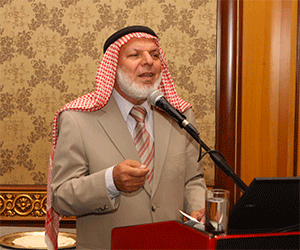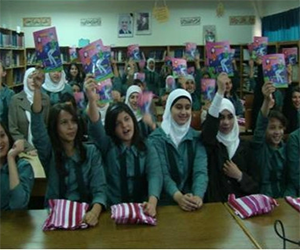I used to be suspicious of family planning programs in Jordan, especially those funded and implemented by foreign institutions,” states Dr. Abdel Rahman Ebdah, Assistant to the Secretary General for Preaching and Guidance and Director of Preaching and Guidance at the Ministry of Awqaf, Islamic Affairs and Holy Places (MAIAHP).
Dr. Ebdah believed that reproductive health initiatives conspire to weaken the Arab population in his country. His concerns are not uncommon in the Hashemite Kingdom of Jordan, where 97% of the population is Muslim and religious leaders are consulted regularly in matters of daily affairs.
However, when the Jordan Health Communication Partnership (JHCP), a nine-year initiative funded by USAID and run by the Johns Hopkins Bloomberg School of Public Health Center for Communication Programs (CCP), wanted to create a new reproductive health/family planning (RH/FP) program, Dr. Ebdah’s support was critical as he serves as the official liaison between JHCP and MAIAHP.
Dr. Ebdah explains: “JHCP convinced me that Jordan needed family planning programming, not just for mothers and children, but for the benefit of families and the nation as a whole.”
JHCP’s health specialists relied on evidence-based findings in their extensive dialogue with Dr. Ebdah, and they underscored the intersection between Islamic teachings on the well-being of mankind and the goals of family planning programming. As a result of these deliberations, the “MAIAHP Family Health Program” was born in 2007.
The “MAIAHP Family Health Program” is a key component of the JHCP program in Jordan. An initiative based on Islamic rulings, it aims to enhance healthy behaviors by raising awareness about RH/FP, and addressing a broad range of issues, including the risk factors of smoking, drug use and addiction, and the importance of nutrition and physical activity.
Dr. Ebdah became a vocal supporter of the MAIAHP Family Health Program. He reassured religious leaders that Islamic law supported the program and encouraged his staff and peers to investigate Islam’s stance on RH/FP, with sweeping results. Through his efforts, over 1000 religious leaders across Jordan have received training on family planning and Islam, a Fatwa was issued in support of family planning and modern contraceptives and influential Muftis participated in CCP’s Advances in Development Communication Workshops that were held in Lebanon and Jordan in 2011.
In addition, a new initiative is trying to bring a third major official Islamic religious authority, the Supreme Judge Department, along with the Ministry of Awqaf and Islamic Affairs and the Department of Iftaa, to prepare a “Pre-Marital Booklet” for couples, with the goal of addressing the high divorce rate in Jordan and providing family health information.
None of this would have been possible without Dr. Ebdah’s support.
“I believe that my willingness to discuss family planning and reproductive health enabled me to bring a fresh perspective to these controversial topics,” Dr. Ebdah asserts. “And now, other religious leaders have deepened their understanding and clarified misconceptions about RH/FP in the context of Islamic law, all for the betterment of Jordan.”




